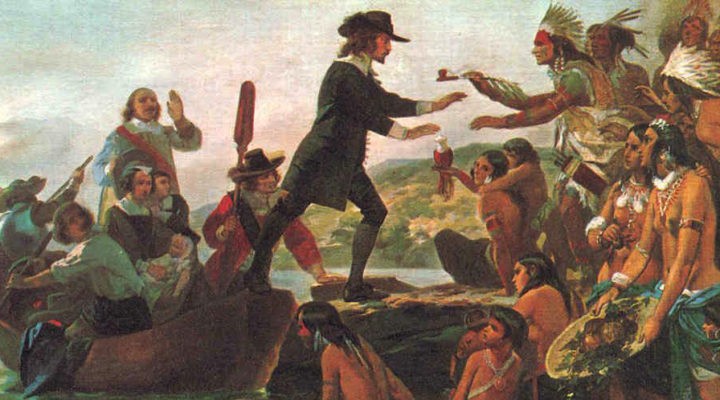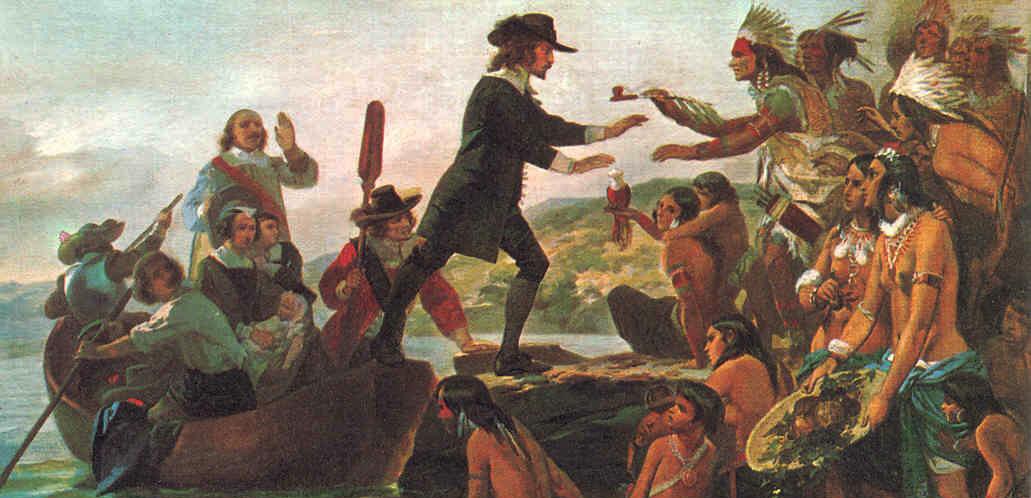In his Key into the Language of America (1643), the earliest Native American/English grammar, Roger Williams, that colonial disquieter of the religio-political peace, described his experiences with the Narragansets and other Northeastern native tribes:
They were hospitable to everybody, whomsoever cometh in when they are eating, they offer them to eat of what they have, though but little enough (is) prepared for themselves. If any provision of fish or flesh comes in, they presently give … to eat of what they have. … It is a strange truth that a man generally find more free entertainment and refreshing amongst these Barbarians than amongst the thousands that call themselves Christians.

Bill Leonard
Unlike most of his Puritan peers, Williams understood the irony of it all: The people who claimed to bring Christ and the kingdom of God into a “heathen wilderness” were actually shamed by the very “Barbarians” they sought to conquer, convert and ultimately displace.
“Irony,” the American Heritage Dictionary says, is the “incongruity between what might be expected and what actually occurs; an expression or utterance marked by deliberate contrast between apparent and intended meaning.”
These days, irony abounds in the American public square, as national and state legislators install law after law targeting such divisive, often interconnected, issues as Critical Race Theory, voter suppression, and historical negation, the motives for which are often “marked by deliberate contrast between apparent and intended meaning.”
These days there appears to be a political pandemic of historical negationism sweeping the land of the free and the home of the ironically challenged. In statehouses across the country, legislators, primarily from one political party, seem oblivious to the irony they are promulgating amid an excess of laws that dictate changes in the way states vote, respond to racial issues or attempt to control “the American story” in the education of new generations.
While the irony of those actions is certainly sobering, their potentially disastrous impact on the American Republic, and the churches therein, may soon become irreparable, extending, with great consequence, “the incongruity between what might be expected and what actually occurs.”
“While the irony of those actions is certainly sobering, their potentially disastrous impact on the American Republic, and the churches therein, may soon become irreparable.”
Sadly, examples abound.
First, some of the same Oklahoma citizens who now seek to minimize or expunge the Tulsa Massacre of 1921 from state textbooks are among those 79% of Republicans who continue to believe that the 2020 presidential election was won not by Joe Biden, but by his predecessor in that office. Through legislation, they seek to limit the significance of one historically documented atrocity, while changing voting laws based on a supposed election fraud that cannot be historically documented. Ironic, isn’t it?
Historian James McPherson says that historical negationism (or denialism) represents “a consciously falsified or distorted interpretation of the past to serve partisan or ideological purposes in the present.” Negationists often misuse historical methodology, present forged documents as genuine, or invent “ingenious but implausible reasons for distrusting genuine documents” or accounts. In communist countries, negationism is known as “state-organized forgetting.”
Such denials have included the Nazi-initiated Holocaust, Japanese war crimes, Soviet gulags, and slavery in the U.S. The Whitman Wire analysis illustrates recent negationist tactics, noting, “Republican Texas lawmakers in 2015 whitewashed teaching standards for American history by deciding to treat slavery as a secondary issue and inserting the myth that states’ rights were the central cause of the Civil War.”
“Long labeled a victim-blaming ‘race riot,’ negationist history kept the massacre out of Oklahoma textbooks until 2001.”
Centennial observances memorializing the infamous Tulsa Massacre of June 1921 challenged Oklahomans to confront the white-instigated destruction of Tulsa’s Greenwood community, known as the Black Wall Street, where 35 blocks of residential and commercial real estate were destroyed and some 300 Black citizens murdered. Long labeled a victim-blaming “race riot,” negationist history kept the massacre out of Oklahoma textbooks until 2001, when the Legislature approved its publication.
Yet a 2021 law, HB 1775, essentially neutered the retelling of the massacre and other “hard truths” of American racial violence since it bans studies that cause students “discomfort, guilt, anguish or any other form of psychological distress on account of his or her race or sex.”
Irony of ironies, legislative action or inaction attempting to “move past” June 1921, Nov. 6, 2020, or Jan. 6, 2021, may ultimately evoke more discomfort, guilt or anguish in the American psyche than telling the whole truth ever will.
Second, laws enacted in multiple states dictating how issues of race and sex are taught in public schools are direct responses to Critical Race Theory, an “intellectual movement” based in the idea that race is a not inherent in human beings, “but a socially constructed category” used to oppress people of color, a systemic reality in the U.S. These new laws restrict or ban the teaching of racially oriented classes and concepts regarding the way racism is acquired.
“When voter restriction becomes voter suppression … legislatures only reinforce Critical Race Theory’s thesis regarding systemic racism.”
Yet these same legislatures are scurrying to impose new voting restrictions with implicit and often explicit racial overtones, intended to make voting more difficult, especially for people of color. Ironically, when voter restriction becomes voter suppression, built not on documented election fraud, but on a historical negation, legislatures only reinforce Critical Race Theory’s thesis regarding systemic racism throughout American society.
The Texas Tribune reported that state law HB 3979 is a Texas version of national efforts by “red-state legislatures” to ban or minimize the teaching of Critical Race Theory. The legislation “says a teacher cannot ‘require or make part of a course’ a series of race-related concepts, including the ideas that ‘one race or sex is inherently superior to another race or sex,’ or that someone is ‘inherently racist, sexist or oppressive’ based on their race or sex.” These ideas are not found in Critical Race Theory.
The Hill cited Texas Lt. Gov. Dan Patrick, who commented: “House Bill 3979 makes certain that critical race philosophies, including the 1619 founding myth, are removed from our school curriculums statewide. When parents send their children to school, they want their students to learn critical thinking without being indoctrinated with misinformation charging that America and our Constitution are rooted in racism.”
Yet an alternative narrative suggests that when “misinformation” about alleged voter fraud is used to limit constitutional voting rights, Critical Race Theory assertions are no myth. Indeed, the Texas Civil Rights Project suggests voter expansion, not suppression, is the state’s greater constitutional necessity, noting, “we have no online voter registration, only a fraction of Texans have the right to vote by mail, and 750 polling places were closed between 2013 and 2019, predominantly in communities of color.” No irony there, this is America.
Ironically enough, Roger Williams proffered his own version of colonial critical race theory, a systemic condition captured in this couplet from Key into the language of America, verses I keep citing in this space:
When Indians heare the horrid filths,
Of Irish, English men
The horrid Oaths, and Murthers late
Thus say these Indians then.
We weare no Cloathes, have many Gods,
And yet our sinnes are lesse:
You are Barbarians, Pagans wild,
Your land’s the wilderness.
Roger Williams didn’t call that 17th century American reality Critical Race Theory. He called it Original Sin. Four hundred years later, it still is. Only now the sins have gotten pretty Unoriginal.
Ironic, isn’t it?
Bill Leonard is founding dean and the James and Marilyn Dunn professor of Baptist studies and church history emeritus at Wake Forest University School of Divinity in Winston-Salem, N.C. He is the author or editor of 25 books. A native Texan, he lives in Winston-Salem with his wife, Candyce, and their daughter, Stephanie.
Related articles:
It’s not just the SBC banning Critical Race Theory; now state legislatures are joining the fight
Juneteenth should remind us of all the things we don’t know | Opinion by Mark Wingfield
When did ‘woke’ become a four-letter word? | Opinion by Greg Garrett
Voting rights and the ninth commandment | Analysis by Stephen Reeves
Voting rights and the people who died for them: Jonathan Daniels et al. | Opinion by Bill Leonard


